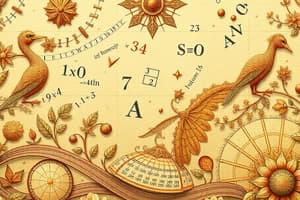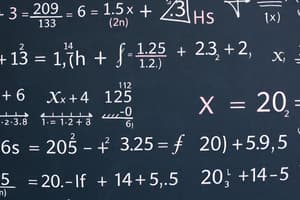Podcast
Questions and Answers
What is a key benefit of studying mathematics in various fields?
What is a key benefit of studying mathematics in various fields?
- It ensures instant success in all endeavors.
- It enhances problem-solving abilities. (correct)
- It fosters creativity and artistic skills.
- It allows for relaxation and leisure activities.
Which of the following is NOT a typical strategy for problem solving in mathematics?
Which of the following is NOT a typical strategy for problem solving in mathematics?
- Implementing appropriate problem-solving strategies.
- Testing the solution for validity.
- Ignoring the problem until it resolves itself. (correct)
- Breaking down complex problems into smaller parts.
How do mathematical models contribute to real-world applications?
How do mathematical models contribute to real-world applications?
- They create random predictions without basis.
- They serve to explain and predict phenomena. (correct)
- They complicate the understanding of problems.
- They offer visualizations without requiring calculations.
Which of the following describes a characteristic of mathematical arguments?
Which of the following describes a characteristic of mathematical arguments?
What is the main purpose of breaking down complex problems into smaller parts?
What is the main purpose of breaking down complex problems into smaller parts?
What is the main focus of algebra?
What is the main focus of algebra?
Which branch of mathematics is primarily concerned with rates of change?
Which branch of mathematics is primarily concerned with rates of change?
What do rational numbers have in common?
What do rational numbers have in common?
Which of the following is a key concept in geometry?
Which of the following is a key concept in geometry?
What do measures of central tendency include?
What do measures of central tendency include?
Which number system includes all positive and negative whole numbers?
Which number system includes all positive and negative whole numbers?
Which of the following is NOT a branch of mathematics mentioned?
Which of the following is NOT a branch of mathematics mentioned?
What is essential in logical reasoning within mathematics?
What is essential in logical reasoning within mathematics?
Flashcards
Arithmetic
Arithmetic
Deals with basic math operations (addition, subtraction, multiplication, division) and number systems (whole numbers, fractions, decimals).
Algebra
Algebra
Uses variables to represent unknowns and solves equations. It also studies functions and their graphs.
Geometry
Geometry
Studies shapes, sizes, and positions in space (2D and 3D).
Calculus
Calculus
Signup and view all the flashcards
Statistics
Statistics
Signup and view all the flashcards
Real Numbers
Real Numbers
Signup and view all the flashcards
Variables
Variables
Signup and view all the flashcards
Equations
Equations
Signup and view all the flashcards
Mathematical Systems
Mathematical Systems
Signup and view all the flashcards
Mathematical Argument
Mathematical Argument
Signup and view all the flashcards
Applications of Math
Applications of Math
Signup and view all the flashcards
Problem-solving steps
Problem-solving steps
Signup and view all the flashcards
Problem-solving strategies
Problem-solving strategies
Signup and view all the flashcards
Study Notes
Basic Concepts
- Mathematics is a fundamental field of study encompassing abstract concepts like numbers, structures, space, and change.
- It employs logical reasoning and symbolic representation to analyze and solve problems.
- Key branches include arithmetic, algebra, geometry, calculus, and statistics.
Arithmetic
- Deals with basic operations: addition, subtraction, multiplication, and division.
- Includes the study of whole numbers, integers, fractions, and decimals.
- Introduces concepts like place value, prime numbers, and factors.
Algebra
- Focuses on the use of variables to represent unknown quantities.
- Develops rules for manipulating expressions and equations
- Introduces concepts like linear equations, quadratic equations, and systems of equations.
- Examines functions and their graphs.
Geometry
- Studies shapes, sizes, and positions of figures in space.
- Includes plane geometry (2D shapes) and solid geometry (3D shapes).
- Covers topics like angles, triangles, quadrilaterals, circles, and their properties.
- Explores the relationships between different shapes.
Calculus
- Deals with continuous change and motion.
- Includes differential calculus, which focuses on rates of change, and integral calculus, exploring accumulated change.
- Uses concepts like derivatives, integrals, limits, and infinite series.
- Crucial in applications like physics and engineering.
Statistics
- Focuses on collecting, analyzing, and interpreting data.
- Utilizes numerical methods and graphical representations to understand patterns and trends.
- Involves concepts like measures of central tendency (mean, median, mode), dispersion (variance, standard deviation), probability.
- Used in many fields for data analysis and decision-making.
Number Systems
- Different number systems exist, each with unique properties and applications.
- Natural numbers (counting numbers): 1, 2, 3, ...
- Whole numbers: 0, 1, 2, 3, ....
- Integers: ..., -3, -2, -1, 0, 1, 2, 3, ...
- Rational numbers: numbers that can be expressed as a fraction p/q where p and q are integers and q ≠ 0.
- Irrational numbers: numbers that cannot be expressed as a fraction of two integers.
- Real numbers: the set of all rational and irrational numbers.
- Complex numbers: an extension of real numbers that includes imaginary numbers.
Logic and Reasoning
- Mathematics relies heavily on logical reasoning and deductive arguments.
- Theorems and proofs demonstrate the validity of mathematical statements.
- Sets of axioms and postulates form the foundation of many mathematical systems.
- Mathematical arguments are precise and rigorous.
Applications of Mathematics
- Mathematics is used in many fields like science, engineering, finance, computer science, and social sciences.
- Models are developed using mathematical concepts to explain and predict real-world phenomena.
- Problem-solving abilities are honed through mathematical practices.
Problem Solving Strategies
- Breaking down complex problems into smaller, manageable parts
- Identifying key variables and relationships
- Developing equations or models to represent the problem
- Implementing appropriate problem-solving strategies (e.g., trial and error, working backwards)
- Testing the solution for validity
- Reflecting on the solution and identifying areas for improvement.
Studying That Suits You
Use AI to generate personalized quizzes and flashcards to suit your learning preferences.




